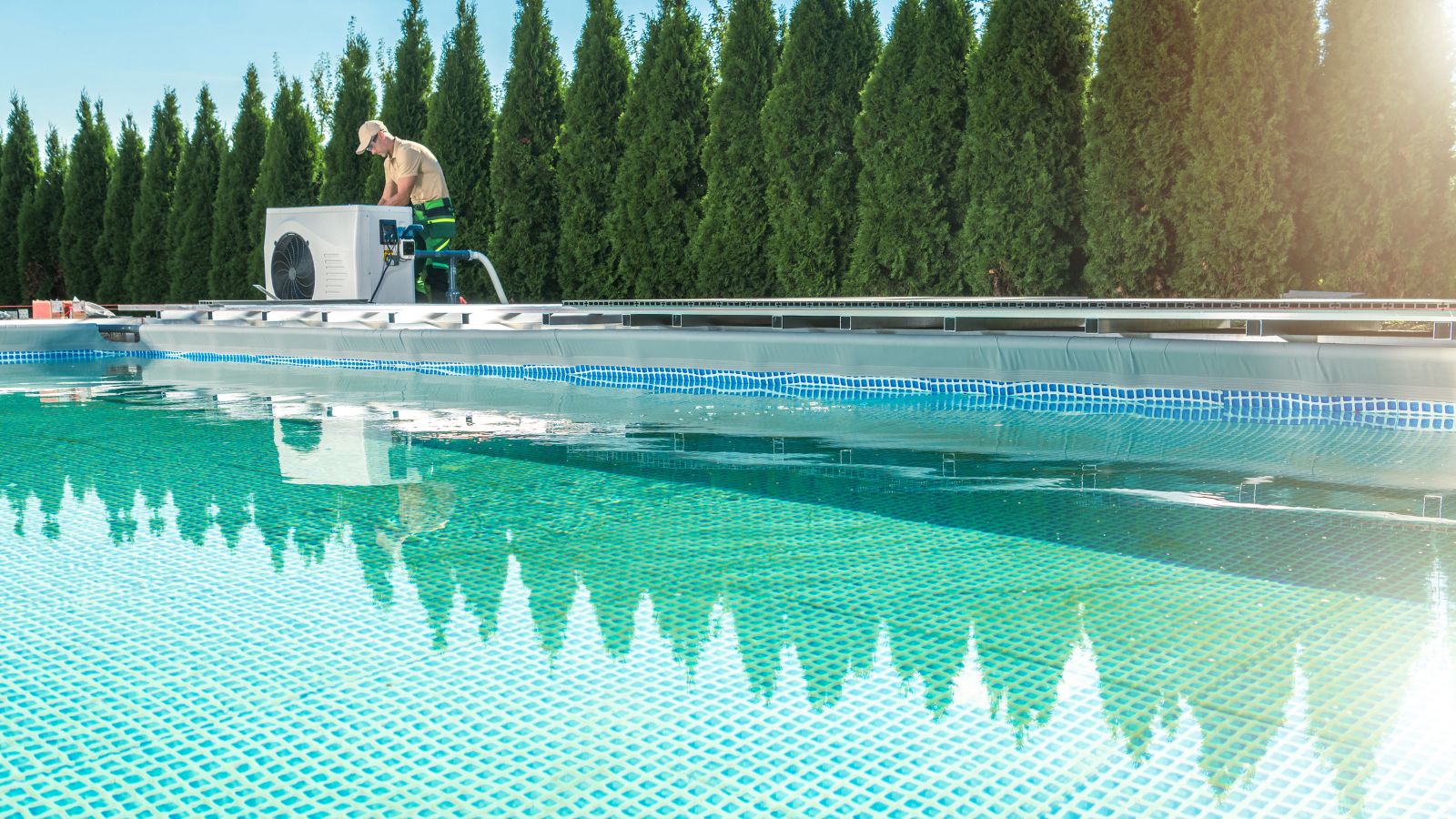Is a Pool Heat Pump Worth the Investment?
Swimming pool owners often face the dilemma of how to extend their swimming season and maintain comfortable water temperatures without breaking the bank. Pool heat pumps have become increasingly popular as an energy-efficient heating solution, but are they truly worth the investment? This comprehensive guide will help you determine if a pool heat pump is the right choice for your specific situation in 2025.
What Is a Pool Heat Pump and How Does It Work?
A pool heat pump operates on the same principle as your home’s air conditioning system but in reverse. Instead of expelling heat from an area, it captures heat from the surrounding air and transfers it to your pool water. Here’s how it works:
- The heat pump pulls in ambient air through an evaporator coil
- A refrigerant inside the coil absorbs heat from the air
- The compressor concentrates this heat, raising its temperature
- The heat is transferred to your pool water as it circulates through the heat pump
- The cooled refrigerant returns to the evaporator to restart the cycle
“The beauty of pool heat pumps lies in their ability to extract free heat from the surrounding air,” explains Jessica Martinez, certified pool professional and energy efficiency consultant. “This makes them up to 600% more efficient than traditional heating methods when operating under optimal conditions.”
Pool heat pumps are rated by BTU output and horsepower (hp). Standard sizes include 3.5 hp/75,000 BTU, 5 hp/100,000 BTU, and 6 hp/125,000 BTU, allowing them to accommodate different pool sizes and heating requirements. Browse our selection of quality pompes à chaleur pour piscines to find the perfect match for your pool size and local climate conditions.
Cost Analysis: Initial Investment vs. Long-Term Savings
Initial Purchase and Installation Costs
Pool heat pumps typically require a higher upfront investment compared to gas heaters:
| Heater Type | Average Cost Range (2025) | Installation Cost |
|---|---|---|
| Heat Pump | $2,500 – $8,000 | $500 – $1,500 |
| Gas Heater | $1,500 – $6,000 | $500 – $1,000 |
| Solar Heater | $3,000 – $7,000 | $800 – $2,000 |
Heat pumps are generally 20-30% more expensive than gas heaters, with prices ranging from $6,000 to $8,000 for premium models. This higher cost reflects their more advanced technology and energy-efficient design Aquaclearpoolcare.com.
Operating Costs Comparison
Where heat pumps truly shine is in their ongoing operating costs:
| Heater Type | Monthly Operating Cost | Annual Operating Cost |
|---|---|---|
| Heat Pump | $50 – $100 | $600 – $1,200 |
| Gas Heater | $300 – $500 | $3,600 – $6,000 |
| Solar Heater | $0 – $10 | $0 – $120 |
Heat pumps use around 5 kilowatts per hour for a typical 100,000 BTU unit. At average electricity rates, this translates to approximately $1.20 to $1.80 per day in operating costs, making them significantly more economical to run than gas heaters Outdoor Direct.
Return on Investment (ROI)
The ROI for a pool heat pump depends on several factors:
- Local climate and length of swimming season
- Local energy costs (electricity vs. gas)
- Frequency of pool use
- Desired water temperature
In most cases, heat pump owners can recoup their additional investment through energy savings within 2-3 years when compared to gas heaters. With proper maintenance, a quality heat pump from our swimming pool heat pumps collection will continue providing these savings for an additional 8-17 years, making them a sound long-term investment.
Top Pool Heat Pumps for 2025
Perfect for small to medium pools with industry-leading efficiency ratings
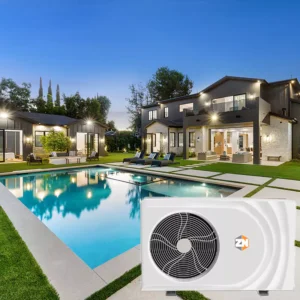
Premium Inverter Heat Pump
Variable speed technology for maximum energy savings
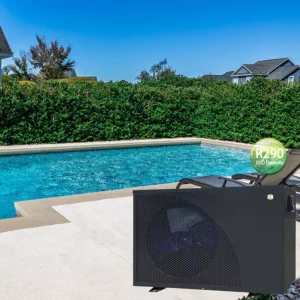
High capacity solution for large residential pools
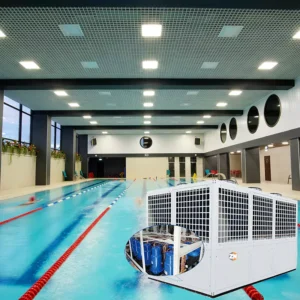
Budget-Friendly Heat Pump
Cost-effective option without compromising on quality
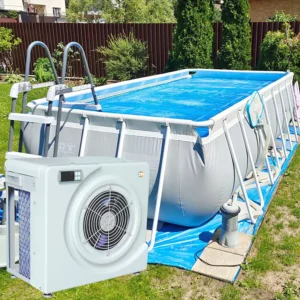
Explore our complete range of pompes à chaleur pour piscines to find the ideal model for your specific needs.
Lifespan and Durability Considerations
One of the most compelling arguments for a pool heat pump is its impressive lifespan:
| Heating System Type | Average Lifespan | Maintenance Requirements |
|---|---|---|
| Heat Pump | 10-20 years | Moderate |
| Gas Heater | 5-10 years | High |
| Solar Heater | 20-30 years | Low |
With proper installation and maintenance, heat pump pool heaters can last 10 or more years, with many premium models reaching the 15-20 year mark Energy.gov. This extended lifespan significantly enhances the value proposition of a heat pump, especially when compared to gas heaters that typically need replacement after 5-10 years.
Dr. Michael Reynolds, thermodynamics engineer and pool heating specialist, notes: “The titanium heat exchangers used in modern pool heat pumps are virtually impervious to corrosion from pool chemicals, which is a primary reason they outlast gas heaters by such a significant margin.”
Climate Considerations and Efficiency
Heat pump efficiency is directly tied to ambient air temperature and humidity. They perform best in:
- Warmer climates with temperatures consistently above 50°F (10°C)
- Regions with moderate to high humidity
- Areas with longer swimming seasons
According to the Department of Energy, “Heat pumps are perfect for use in warmer climates! Heat pumps are most efficient when they’re heating outdoor air that’s above 50 degrees Fahrenheit. Anything below 50 and a heat pump does start to lose efficiency.” Energy.gov
Our pompes à chaleur pour piscines include models designed for various climate conditions, including options with enhanced low-temperature performance for cooler regions.
The efficiency of a heat pump is measured by its Coefficient of Performance (COP):
| Climate Conditions | Typical COP | Effectiveness |
|---|---|---|
| Above 80°F | 5.0 – 6.0 | Excellent |
| 60°F – 80°F | 4.0 – 5.0 | Very Good |
| 50°F – 60°F | 3.0 – 4.0 | Good |
| Below 50°F | Below 3.0 | Fair to Poor |
A higher COP indicates better efficiency. For example, a COP of 5.0 means that for every unit of electricity consumed, the heat pump produces 5 units of heat energy for your pool. The most efficient models in 2025 feature COP values close to 6.0 PoolPartsTogo.
Environmental Impact and Sustainability
Heat pumps offer significant environmental benefits compared to traditional gas heaters:
- Lower carbon footprint due to higher energy efficiency
- No direct emissions of greenhouse gases during operation
- Can be paired with solar panels for nearly zero-emission pool heating
- Longer lifespan means less frequent replacement and reduced manufacturing impact
According to 2025 data, the heat pump market is experiencing substantial growth, with global values estimated to increase from $88.4 billion in 2024 to $134.8 billion by 2030, at a compound annual growth rate (CAGR) of 7.7%. This growth reflects the increasing adoption of heat pumps as an environmentally sustainable heating solution GlobeNewswire.
“In the face of rising energy costs and growing environmental awareness, pool heat pumps represent one of the most sustainable choices for pool owners,” states Sarah Thompson, Director of Sustainable Technologies at the Pool & Hot Tub Alliance. “The technology effectively reduces both carbon emissions and operating costs while extending the usability of your pool investment.”
Pool Heat Pump vs. Alternative Heating Options
Heat Pump vs. Gas Heater
| Factor | Heat Pump | Gas Heater |
|---|---|---|
| Initial Cost | Higher ($2,500-$8,000) | Lower ($1,500-$6,000) |
| Operating Cost | Low ($50-$100/month) | High ($300-$500/month) |
| Heating Speed | Moderate (1-2°F per hour) | Fast (3-5°F per hour) |
| Lifespan | 10-20 years | 5-10 years |
| Impact sur l'environnement | Low | High |
| Efficiency | High in warm climates | Consistent in all climates |
Gas heaters can heat your pool faster but at a significantly higher operational cost. As one pool expert put it, “Think of a gas heater as a muscle car and a heat pump as a bike. A gas heater will definitely heat your pool faster, but you’ll pay a price for it when the energy bill comes.” Energy.gov.
Heat Pump vs. Solar Heating
| Factor | Heat Pump | Solar Heating |
|---|---|---|
| Initial Cost | Moderate to High | Moderate to High |
| Operating Cost | Low | Very Low |
| Heating Speed | Consistent | Dependent on sunlight |
| Lifespan | 10-20 years | 20-30 years |
| Impact sur l'environnement | Low | Very Low |
| Efficiency | Good in most conditions | Excellent but weather-dependent |
Solar heating offers the lowest operating costs but depends heavily on consistent sunlight and typically takes longer to heat your pool. Heat pumps provide more reliable heating regardless of weather conditions but require electricity to operate.
For those interested in exploring options, our pompes à chaleur pour piscines section offers a variety of solutions to match your specific needs and budget.
Financial Incentives and Rebates in 2025
Various incentives can help offset the initial cost of a pool heat pump:
- Federal tax credits: Starting January 1, 2025, heat pumps that are recognized as ENERGY STAR Most Efficient are eligible for federal tax credits ENERGY STAR
- State and local rebates: Many utility companies offer rebate incentives ranging from $350 to $800 for energy-efficient pool equipment CenterPoint Rebates
- Manufacturer rebates: Companies like Pentair offer additional rebates on heat pump purchases and installations Pentair
The Inflation Reduction Act has expanded heat pump incentives, with rebates up to $2,000 available for qualifying installations through 2032 Environmental America.
“The current incentive landscape makes 2025 an ideal time to invest in a pool heat pump,” explains Thomas Chen, energy policy analyst. “Between federal tax credits, utility rebates, and manufacturer promotions, many of our customers are saving 20-30% on their total installation costs.”
Be sure to check the specifications of our pompes à chaleur pour piscines to identify which models qualify for these valuable incentives.
Maintenance Requirements and Considerations
Proper maintenance is crucial for maximizing your heat pump’s lifespan and efficiency:
Regular Coil Cleaning
Keeping the evaporator coil free of debris ensures optimal heat transfer
Water Flow Verification
Proper water flow is essential for heat pump efficiency
Winter Protection
Proper winterization extends the life of your investment
Key maintenance tasks include:
- Regular cleaning of the evaporator coil to remove dirt and debris
- Ensuring proper water flow through the unit
- Maintaining correct chemical balance in your pool water
- Scheduling annual professional inspections
- Protecting the unit from extreme weather conditions
According to heat pump manufacturers, proper maintenance can extend a heat pump’s lifespan by 30-50% and maintain optimal efficiency throughout its life Flipr.
Visit our pompes à chaleur pour piscines page for detailed maintenance guides specific to each model we offer.
Technological Advancements in 2025
The latest pool heat pump technology offers significant improvements over older models:
- Inverter technology that adjusts power consumption based on heating demand
- Wi-Fi connectivity and smartphone app control
- Enhanced defrost capabilities for operation in cooler temperatures
- Higher COP ratings (6.0+) for greater energy efficiency
- Quieter operation with sound-dampening components
Robert Johnson, chief design engineer at a leading heat pump manufacturer, shares: “The inverter technology we’ve incorporated into our 2025 models represents the biggest leap forward in pool heating efficiency in the past decade. Instead of the on-off cycling of traditional systems, inverter heat pumps continuously adjust their output to match demand, reducing energy consumption by up to 30% while extending component lifespan.”
Many of these advanced features are available in select models from our pompes à chaleur pour piscines collection.
Common Questions About Pool Heat Pumps
Are Pool Heat Pumps Cheaper Than Gas Heaters?
While heat pumps have a higher upfront cost, they are significantly cheaper to operate. Heat pumps cost approximately $0.63 per hour to run on electricity, a fraction of the cost of propane or natural gas pool heaters. Despite the higher initial investment, the operating cost difference means heat pumps typically pay for themselves within 2-3 years compared to gas heaters Leslie’s Pool.
How Warm Can a Heat Pump Get My Pool?
A premium-grade pool heat pump can effectively warm your swimming pool to between 78°F and 104°F. For most residential pools, a comfortable swimming temperature falls between 78°F and 82°F, which is well within the capability of modern heat pumps. The maximum achievable temperature depends on factors like ambient air temperature, pool size, and whether you use a pool cover Outdoor Direct.
Our pompes à chaleur pour piscines include models designed for various heating requirements, from maintaining comfortable swimming temperatures to spa-level warmth.
Should I Run My Pool Heat Pump 24/7?
For optimal efficiency, it’s recommended to run your heat pump continuously. As noted by pool experts, “Most of the wear and tear on the system is at start-up and shutdown.” Running the pump continuously maintains a stable temperature and actually uses less energy than repeatedly heating a cooled pool Reddit.
What Are the Disadvantages of a Pool Heat Pump?
The main disadvantages include:
- Higher upfront cost compared to gas heaters
- Slower heating time, especially when starting with cold water
- Reduced efficiency in cooler temperatures (below 50°F)
- Requires electricity to operate, so no heating during power outages
- Larger physical footprint than some other heating options
Despite these drawbacks, the long-term operational savings and environmental benefits often outweigh these considerations for most pool owners The Swimming Pool Store.
Choosing the Right Heat Pump Size for Your Pool
Selecting the appropriate heat pump capacity is crucial for optimal performance and energy efficiency. Here’s a general sizing guide:
| Pool Size (Gallons) | Recommended BTU Rating | Approximate Heat Pump Size |
|---|---|---|
| Up to 10,000 | 50,000 – 65,000 BTU | 3 hp |
| 10,000 – 20,000 | 65,000 – 85,000 BTU | 3.5 – 4 hp |
| 20,000 – 30,000 | 85,000 – 120,000 BTU | 5 hp |
| 30,000 – 40,000 | 120,000 – 150,000 BTU | 6 – 7 hp |
| Over 40,000 | 150,000+ BTU | 8+ hp |
“Proper sizing is perhaps the single most important factor in ensuring heat pump satisfaction,” explains pool engineering consultant Emily Williams. “An undersized unit will struggle to reach desired temperatures, while an oversized one will cost more upfront and cycle on and off too frequently, reducing efficiency and lifespan.”
Our team can help you select the right model from our pompes à chaleur pour piscines collection based on your specific pool dimensions and local climate conditions.
Is a Pool Heat Pump Right for You?
A pool heat pump is likely worth the investment if:
- You live in a climate with temperatures consistently above 50°F during your swimming season
- You plan to use your pool for many years
- You value energy efficiency and lower monthly operating costs
- You’re concerned about environmental impact
- You’re willing to make a larger upfront investment for long-term savings
On the other hand, a gas heater might be more suitable if:
- You need to heat your pool quickly for occasional use
- You live in a region with very cold temperatures
- Your swimming season is very short
- Upfront cost is your primary concern

